
Careers
- Details
Solicitors in Local Government has launched a Local Lawyers in Schools Initiative with the Citizenship Foundation. Guy Goodman encourages local government lawyers to get involved.
During my year as Chair of SLG I had my eyes opened to the importance of pro bono and corporate responsibility work and the fact that we in local government don’t do enough of it.
As a result SLG has formed two partnerships. One is with LawWorks, the Solicitors Pro Bono Group, which seeks to promote and publicise pro bono opportunities to local government practitioners. We have also been involved in some myth busting through our magazine, Noter Up, particularly around conflicts of interests by explaining the wide variety of opportunities available via LawWorks.
The second partnership is with the Citizenship Foundation to deliver a SLG version of their Local Lawyers in Schools initiative. We have secured three-year funding from the Local Government Legal Society Trust Fund for three SLG sites in England and Wales. The golden rule with our sites is that more than one local authority has to be involved.
We currently have two sites signed up and raring to go in this school year. The first site is in Yorkshire and led by Lisa Dixon, Legal Services Manager at Scarborough Borough Council. Lisa and colleagues at Scarborough have experience of Local Lawyers in Schools having taken part last year but have now joined forces with North Yorkshire County Council, Ryedale District Council and East Riding of Yorkshire Council. The details of the partnering school are being confirmed and training will take place shortly.
The second site is Leicestershire, which I am leading joined by colleagues from Leicestershire County Council, Leicester City Council, Oadby and Wigston Borough Council, Charnwood Borough Council and Nottinghamshire County Council. Our school is New College Leicester which has had a troubled history, is located in one of Leicester’s poorer outer estates but which is gradually improving. Our training will take place on Tuesday 21 September 2010 with sessions due to start this term.
There has been much interest in establishing the third site but no firm proposal as yet – and there is still plenty of time to get a site up and running this school year. If you are interested please just contact me at
In case you don’t know what Local Lawyers in Schools is all about read on.
In brief you need a group of about ten lawyers to do six workshops in the school year to KS4 pupils as part of the Citizenship Curriculum. The topics that have been prepared professionally by the Citizenship Foundation for which we get all the teaching materials are:
- Learning about the Law
- Employment Law
- Consumer Law
- Human Rights
- Youth Justice
- Police Powers
- Discrimination
- Intellectual Property & Downloading Music
- Housing Law
- Family Law.
A minimum of five volunteers is needed for each session. Involvement in the initiative attracts CPD.
In order to host a site someone needs to volunteer to co-ordinate colleagues and make the arrangements with your chosen school. As local government lawyers you should have enough contacts to find an appropriate school in a socially deprived area.
We are hoping that as the three years go by existing sites will take on the funding themselves (about £500 for the year which is £50 each for ten volunteers for nine unaccredited CPD hours) so that other sites can be developed.
The benefits, as well as the CPD, include refining your communication skills (particularly listening) and presentation skills, and giving something back to the community. So what’s your excuse for not getting involved?
Guy Goodman was chair of SLG (www.slgov.org.uk) in 2009/10.
- Details
A commitment to ethical behaviour is the distinguishing feature of professional occupations, but for 21st century lawyers doing the right thing goes beyond the traditional professional rules, writes Paul Gilbert
A very good friend of mine was somewhat nonplussed by an announcement a few years back; he had heard that the Law Society in England & Wales had set up an “Essex Helpline”. “What on earth” he opined “did the Law Society think it was doing spending our money on something just for Essex? And what the hell was going on in Essex that they needed their own helpline?”
He was so wound up that I did not have the heart to tell him immediately that it was in fact the “Ethics Helpline”!
Professional ethics, of course, have been part and parcel of the legal profession for hundreds of years; without wanting to sound at all arrogant or self-serving this is one of the great strengths of the profession. Clients, whether they are the humblest of individuals or the mightiest of corporations, can rely on their lawyers acting in their best interests.
Students who come to study the law learn quickly how it is possible to represent even the most reprehensible individual, never to lie or to deceive the courts, but because in the end the strength of a democratic society is judged by ensuring the fairness of the trial and protection from an overbearing State.
Trainee lawyers learn that confidentiality is not just about keeping commercial secrets safe, but a fundamental tenet of their integrity and personal credibility.
Junior lawyers come to understand that privileged advice is not a misnomer; it is indeed a privilege to be able to fearlessly advise a client on their rights, their responsibilities and their plans.
And yet in the second decade of a new century the centuries old traditions look like they might have lost their lustre just a little. I do not mean that the profession is less professional or that access to justice, confidentiality and privilege (etc) are less valued; but I do wonder if it is enough and whether we need to do even more.
In the last ten years we have seen Enron, the near collapse of the banking system, an adrenalin fuelled tech bubble, what many consider to be an illegal war in Iraq, endemic corruption in some States and a legal profession that looks increasingly uncertain as to whether it is a consumer-driven, branded and commoditised service or an independent, bespoke, and hands-off advisory service.
In this last turbulent decade I do not want to pretend that the lawyers could have (should have) done more in a sort of faux heroic role acting as protector of the common good; but I do want to challenge whether the old precepts of professionalism have adapted enough to cope with the demands of 21st Century living, commerce and politics.
It is not just the world that has changed, but the profession has changed too. Look at how many lawyers are now employed by authorities, institutions and businesses to be in-house legal advisors; consider how transformatory the internet and email has been in the way lawyers communicate with their clients and with each other; and reflect as well on how this has also been influential in opening up new markets and new territories.
I see all these things as very positive; the legal profession has become a globalised phenomenon that has, in less than a generation, moved from being seen as Dickensian in its practices to something that influences millions and millions of lives every day by supporting everything from governments and international trade on the one hand, to the lease of the corner shop and a defence lawyer for the arrested shoplifter on the other.
So, given all this change externally and within the profession – should we examine whether what “professionalism” means today is enough? Are we still adequately protecting our fellow citizens? Do we in fact need a new normal for what ethics should mean today? My emphatic answer is that yes we do, but I am not going to pretend to have answers to such complex and important issues as these. I do think however that we need to have the most informed debate we can.
There are two crucial factors as to why we must do so and why there is not a moment to waste.
First, because our world has changed so much and modernisation does not always go hand in hand with simultaneously developing an up to date ethical code that supports innovation and change;
Second because in an ultra competitive and de-regulating world where services might in future be provided by all and sundry and where being a fully qualified lawyer might become less and less meaningful, we need to re-assert the values of the profession.
What might the new ethics look like? Perhaps a responsibility not just to see that decisions are made within the tight definition of statute or regulation; but a duty to at least ask the question is this in the interests of council tax-payers, shareholders and employees as well? Or an obligation to ensure that companies and institutions demonstrate a serious, proportionate and competent commitment to regulatory compliance? Or a responsibility to enquire whether the policies and practices of an organisation are environmentally sustainable? Perhaps a requirement to sign-off deals, trading statements and accounts as having been achieved without corruption?
More grandly, should there be a duty on every lawyer to protect the rule of law and to proactively promote access to justice.
I am of course aware that within the confines of such a short article précised ideas can look foolish and crazily simplistic; but at the heart of this concern for what ethics should look like today, is I think a legitimate and very real concern for lawyers. Frankly what is the point of lawyers if all legal knowledge, wisdom and insight is apparently capable of being synthesised to a few bytes of digital information?
For the sake of the profession, I believe lawyers themselves must at least be prepared to explore what being a lawyer means today and therefore to re-establish an ethical code that supports our modern, diverse and multicultural profession. Not just an Essex helpline, but one for all of us to reassert our value and our values in such a busy, crowded and impatient world.
Paul Gilbert is Chief Executive of LBC Wise Counsel, the UK based specialist management and skills training consultancy for lawyers.
- Details
Laurie Trounce is a solicitor in the commercial team at Cornwall Council who, despite only qualifying in September last year, won the Solicitors in Local Government’s Young Solicitor of the Year award for 2010.
1. When and why did you decide to become a lawyer?I was interested in becoming a solicitor from about the age of 15 having completed work experience placements at local firms of solicitors and the CPS. I then went on to study Law with German Law which nearly put me off but I persevered!
2. Have you always worked in local government?
Yes, I was very fortunate to get a training contract with Cornwall Council Legal Services and I qualified in September 2009 I joined the Commercial Team.
3. What has been your proudest moment so far in your local government career?
My proudest moment was being awarded the SLG Young Solicitor of the Year Award 2010.
4. What one piece of legislation affecting local government would you change and why?
The rules on state aid as they are fraught with confusion and difficulty. It's never clear when and how the rules apply as they as so fragmented which constantly frustrates clients.
5. What major changes do you see affecting local government legal practice in years to come?
Due to substantial cuts in public spending and the increased use of shared services as a method of enhancing the efficiency of local authorities' corporate support functions, I do not doubt that the delivery of legal services in local government will undergo significant change in the months ahead. How legal departments engage and adapt to these changes to demonstrate their value will undoubtedly influence how legal services in local government are delivered in the future.
6. What advice would you give to lawyers who are just about to start a career in local government?
Being a trainee in local government has been a fantastic experience and I encourage anyone looking for a training contract to seriously consider working for a local authority. I was given the opportunity to get involved in interesting projects and manage my own case load from an early stage. The work is rewarding, challenging and unbelievably varied so you need to be ready to advise on just about anything!
7. If you hadn’t become a lawyer, what would you have done?
I would have liked to have worked for the Foreign and Commonwealth Office or been a translator.
8. If you had to recommend one place/attraction to visit in the authority you’ve most recently worked at, where would it be and why?
I would recommend visiting the beautiful fishing village of Portloe because I live there and can thoroughly recommend the cream teas!
9. Yes, Minister or The West Wing?
The West Wing
10. What was the last good book you read?
Khaled Hosseini’s A Thousand Splendid Suns.
- Details
As a manager your main goal should be to help people feel confident in their role, and make them believe that they have the capacity to contribute, grow and develop within the organisation, writes Rachael Woodman
According to recent research, the last twelve months have seen stress levels across the country reach an all time high, costing the UK economy an estimated £25.9 billion per year. Another report, from the charity, Mind, has suggested that the numbers of people reporting having left a job due to stress rose from 6% in 2004 to 8% in 2009. But with increased working hours, significant financial pressures and the continued threat of job losses - are these statistics really surprising?
In the light of these figures, legal recruitment specialists Sellick Partnership recommend that employers need to consider the impact of these pressures on their workforce and how they can ensure that they retain a healthy, productive and motivated team, particularly through periods of change. Additionally if a number of redundancies have been made within the organisation, it is important for you to restore and maximise trust within the workplace.
For an employer there are a number of strategies that can be implemented to help increase productivity, boost morale and promote long-term cost efficiencies. They include:
Communication
Communication is always key; however it is particularly important during periods of change and adjustment. Management teams need to be consistent and open in the messages that they are communicating to teams, ensuring that employees are clear and up to date on activity and performance. Strong internal communication can have a significant impact on morale, as it makes employees feel part of the team – contributing to the future of the company. Additionally communication provides reassurance, which in turn will increase motivation.
Through regular reviews, team meetings and internal communication, all employees should be assured by the management team, as well as providing a consultative approach within the workplace. Employees need to be able to feel that they are listened too – and that there is a channel for them to offload any concerns they may have.
Career development
Take the time to have a discussion about career development with each of the people that report to you, as it will help identify the additional training, resources and support that they feel they need. This will enable you to assess their expectations, as well as assure them of their value within the business, removing any doubts they may have regarding job security.
Restoring trust
Trust will have been injured during a downsizing; staff must be assured of their value. Firstly, recognise that people are experiencing a loss of their co-workers and will experience a range of emotions from anger and loss to guilt at having been chosen to remain within the organisation. It is important to be sympathetic to their position and facilitate the transition from the past to a new focus on the future.
Teambuilding
As budgets get tighter, staff morale and retention is more important than ever. As a result many employers are turning to teambuilding to get the best out of their employees. Bringing an organisation together for a well-planned team-building event not only improves internal relations but can also provide employees with reassurance for the future. Additionally, time out of the office is the perfect opportunity to present your strategy and motivate staff for the year ahead.
Some stress is good as it motivates people and makes them stronger. However, in the current climate it is very easy for that stress to become too much and have a detrimental impact on productivity and ultimately your profitability, so it is key that employers and managers address the above factors.
Look after your own health
From the other side, it is also important to think about yourself and your health; it is very easy to get caught up thinking about those individuals around you and forgetting about yourself. You need to take the time to step back and assess the situation – and adopt some strategies to help you.
There are a number of areas that you can change to relieve stress at work. Time management is often something that you can easily lose control of, which can be readdressed very quickly. For example, write a ‘to do’ list for the following day, re-prioritising your tasks, and identifying those that can be delegated to others in your team.
Do you often get to the end of your day and realise that you have not had any fresh air? Taking breaks away from your role are important – and going outside for a stroll can make a massive difference to how you feel. If this isn’t always possible, adopt some deep breathing relaxation exercises that you can do at your desk, or take the time to catch up with colleagues – laughter is always a good stress reliever!
The time that you spend out of work, can also make a difference to how you feel in work – take regular exercise, catch up friends and get plenty of rest.
Rachael Woodman is a manager in the Sellick Partnership Legal Division.
- Details
The latest lawyer to step up to the plate and answer LGL’s 10 Questions is Rob Hann, director of legal services at Local Partnerships and author of wartime novels and children's verse.
1. When and why did you decide to become a lawyer?
I went to an interesting comprehensive school in White Hart Lane Tottenham where a lot of my contemporaries got into law – but not in a good way! I left school and after a few jobs in banking etc ended up working at the Metropolitan Police solicitors department, part of the then Civil Service and forerunner to the CPS. Eventually I decided a career in law was for me so I returned to education and became a solicitor, qualifying (after articles etc) in 1986.
2. Have you always worked in local government?
I was articled at Sheffield City Council – known then as the Socialist Republic of South Yorkshire – when David Blunkett was Leader in the mid-1980's and Mrs Thatcher was in power. It was a very exciting and challenging environment for a young lawyer and I got a real grounding in judicial review litigation! I have spent the majority of my career to date in local government working for a number of authorities as a senior lawyer, but I also had two forays into the private sector with Eversheds before ending up at 4ps (now Local Partnerships).
3. What has been your proudest moment so far in your local government career?
Recently, it was appearing before a committee of the European Parliament as an expert on behalf of 'CEMR' (effectively the Local Government Association equivalent in Europe) to give evidence to MEPs about developments in UK procurement. In the early days, it was publishing my first local authority book in 1996 – Local Authority Charging Powers – a compendium giving local authorities a steer of where to find powers to charge for discretionary services and potentially generate income.
4. What one piece of legislation affecting local government would you change and why?
The Treaty of Rome, procurement directives and all associated regulations. How can buying 'stuff' be so fraught with difficulty, expense, delay, uncertainty, and fear of litigation? There must be a better way.
5. What major changes do you see affecting local government legal practice in years to come?
There will be huge pressure on in-house lawyers to join up regionally to deliver legal services over a wider geographical spread to similar 'clients' but mindful of the need to remember who the client is to prevent conflicts of interest etc.
6. What advice would you give to lawyers who are just about to start a career in local government?
Go for it if you can find a training contract. When I started out, local government was a brilliant starting point to gain experiences across a range of subjects, including litigation, child care, prosecutions but also law making (bye-laws), land transfers, joint ventures, partnerships, companies….the list is endless. Sadly there appears to be less opportunity for training contracts in local government these days – a real pity.
7. If you hadn’t become a lawyer, what would you have done?
I would have scribbled more and hopefully have published a few more books in a wider range of subjects than the current range (law, war, and the Grumblegroar as my 10-year-old concisely put it).
8. If you had to recommend one place/attraction to visit in the authority you’ve most recently worked at, where would it be and why?
The Nottingham Express transit system – the most efficient, modern effective transport system in the UK (says I), procured by two far-sighted councils (Nottingham City Council and Nottinghamshire County Council) against all the odds and with a little help from yours truly over many years in many different guises!
9. Yes, Minister or The West Wing?
No contest: Yes, Minister. Believe me Sir Humphrey still stalks the corridors of power!
10. What was the last good book you read?
The new compendium of Spike Milligan non-sense poems 'knees, knees youve got to have knees, they come in two's and never three's....etc'. Can’t beat that.
Rob Hann is a solicitor and Director, Legal Services for Local partnerships LLP, a public sector consultancy owned jointly by the Local Government Association and Partnerships UK (whose interests in LP are soon be transferred to HM Treasury). Rob is also the author of several local government legal textbooks on local government law including Local Authority Companies and Partnerships and The PFI and Major Strategic Procurement in Local Government (both of which are updated twice a year). He is also the author of a prize-winning novel, SAS Operation Galia (published by Impress books), and a writer of children's verse, The Grumblegroar.
If you would like to be the subject of 10 Questions, email us at
- Details
In the turbulent, nail-biting anti-climax that followed the inconclusive 2010 General Election, the politicians - indeed the whole country – have often wished it was all over. It is now. At least for so long as the tortuously assembled Conservative-Liberal Democrat coalition that finally coalesced on the evening of 11 May 2010 holds together.
But as stark political realities once more move centre stage, the economic future is set to be decidedly bleak for all in the public sector given the disastrous state of the nation’s finances. Churchill’s speech as new Prime Minister to the House of Commons on 13 May 1940 comes to mind then he said that he had ‘nothing to offer but blood, toil, tears, and sweat’. But while the Blitz and Dunkirk may now be distant memories, the reality rather than the expectation of creating more from less will very soon be arriving at your workspace. And if it’s not quite apocalypse now, it will certainly be austerity now – and to come.
But if charity is said to begin at home so must what might be regarded as its obverse: financial retrenchment – i.e. belt-tightening. So a good place to start is your own operation. And it makes sense to take the initiative before the heavies start battering at your door. Here’s a few things you might look at for starters.
Legal Departments
What are we doing for whom and why?
It seems to me the first thing is to review carefully just what work you are doing and for whom. You may have done this before but it’s certainly worth a critical revisit in the present context. For custom and practice can often end up with lawyers and their colleagues performing tasks or parts of tasks that could quite as well be handled by client departments themselves. Once you know just what your operation is doing then an updated dialogue with key client contacts can take place.
This should be transparent about the resource that is actually available for them (which may be a lot less than they think!), the tasks currently being carried out and what actually needs critically to be done going forward and how that can best be resourced. This may well help client representatives scope their strategic priorities. For (assuming the legal operation is working at optimum efficiency) economic, effective and efficient in-house supply is the best value solution to core legal services.
Demand-led funding
Many authorities have already introduced this for their service departments. In simple terms such departments have no pre-allocated legal services budget but are funded in relation to demand for their services. This should in practice help balance the demand/supply equation since the problem with pre-set budgets is the need to reconcile often infinite demand against a fixed and diminishing resource base. And if there is no pre-set budget, there is no specific requirement for annual legal services budget reductions. However, ‘playing shops’ can only go so far. For ultimately council employees are council employees and consequently require a stable funding flow. So there needs to be clear corporate agreement on anticipated demand patterns when ‘front line’ service budgets are being set and legal services will clearly need critical input into these discussions.
Working smarter – how are we doing?
Human beings are complex beasts and it is always important not to kill the goose that lays the golden egg by stiflingly prescriptive procedural requirements. However, it is certainly worth asking and following through with a few testing questions. For instance is work distribution and production organised as effectively and efficiently as possible? Are the right horses running on the right courses? Are people trained up and motivated to make best use of the technology available? Are people allowing themselves to get diverted by the perhaps unimportant stridency of the moment and missing the bigger picture? Are some of your people coasting, time-serving or taking an unreasonable time to perform reasonable tasks? Are some throwing dubious sickies? Are some frankly not up to the job?
Once you’ve got your head around those, here are a few additional basic points that many of us can fall short on and which might help you and yours:
Work management is like driving. While you're concentrating on the road ahead (the current thing on your desk) you've got to keep a constant eye on the dashboard dials, the rear and side mirrors and the unexpected e.g. the child that dashes out from behind the parked vehicle. So while focusing on the job in hand, have a constant eye for shifting priorities on your other matters. Also always do what needs to be done, and not what you feel like doing! Use a reminder system (whatever suits you or is to hand) to note all deadlines in good time before they hit. And of course take the necessary action on them!
Client communication is key. The client for these purposes is whoever you've promised to do something for! Never allow a deadline to approach (or even worse pass) without having got back to your client well in advance to renegotiate, reposition or even (shock, horror) to report that you've done what you said you would! Your workplace 'share price' relies on your reliability. Always aim to exceed expectations i.e. always better to under-promise and over-deliver rather than vice-versa.
Distinguish between importance and urgency. What's important isn't necessarily urgent and vice versa. As mentioned, take quick mental stock regularly throughout the day of all the things you're responsible for (known in the trade as 'keeping the plates spinning') and make sure you've done what's necessary – and crucially what you've said you'd do! Don't be thrown off course by e-mails. Subject them to proper prioritisation, whilst maintaining politesse – e.g. an acknowledgment and estimate can often be done fairly quickly but don't let a strident e-mail divert you from priority unless it needs to.
One bite at the cherry! Subject to instructions, it's time effective while you're on with a matter (and your metaphorical aircraft is flying) to do all the things that need to be done at this stage. Take off and landing are time and effort expensive!
Do unto others as you would have them do unto you. Put yourself in your client's position (client per point 3). How would you feel if you were your own client? Keep your conscience well fed and it won't trouble you!
If you've got a difficulty talk to your manager. Most of them are human and they've all been there. In fact many of them may well still be there!
Collaboration
In modern local government, collaboration is becoming the way of the world. Apart from the seam that pervades the Local Democracy, Economic Development and Construction Act 2009 (with Leaders’ Boards, regional strategy, Economic Prosperity Boards and Combined Authorities) collaboration is of course at the core of the Total Place concept which emphasises area public service financial and other synergies and an increased focus on user outcomes. But closer to home, exploring synergies with other local and public authorities may well bear fruit.
Apart from rationalising service provision (e.g. advocacy at common court centres) knowledge (the core raw material of legal departments) can be shared virtually on-line by any number of participating bodies, systematised to meet the needs of participants. There are many different models of shared service provision available (including joint teams, joint managers, merger of legal teams and co-ordinated area provision (as with Lincolnshire). However, the key is to find a model that is going to work practically in the local organisational and political contexts and, critically also, win buy-in from all those on the ground who will be having to make it work. For the most brilliant piece of theoretical aeronautical engineering will be useless if fails to fly in practice.
Changing the Culture
Organisational cultures are strange things – invisible yet pervasive and almost tangible. A lab analysis would probably find many ingredients; not least off-the-shelf assumptions and attitudes way past sell-by date. These may have been created long ago by forceful ‘ancestors’ and passed down as ‘writ’ to succeeding ‘generations’ or simply prompted by the forceful demeanour of leading members and officers. But whilst some cultures are wholesome and productive others are clearly toxic, negative and defeatist.
We’ve all heard the well-known rallying cry to stasis: ‘You can try that but it won’t work here!’. Well it can – given a fair wind together with some firm will, resolution and resilience. But it must start with you – wherever you sit in the organisation. For a positive, can-do attitude and ‘make-it-happen’ approach is infectious and can spread like a benign virus. And if you’re a team leader there is an extra onus on you to follow the advice given in the 1944 hit song i.e. accentuate the positive, eliminate the negative and latch on to the affirmative. For those choosing to mess with Mr. In-Between may well end up victims of their own dire self-fulfilling prophecies.
Working for others
Using existing legal powers (e.g. the old but trusty Local Authorities (Goods and Services) Act 1970 but also where appropriate well-being and section 111 of the Local Government Act 1972) councils can conduct work for other authorities and bodies thereby bringing in much-needed revenue. Geoff Wild, Director of Law and Governance at Kent County Council and his colleagues are amongst the field leaders in this area, generating some £1.42m last year which has been ploughed back into Council frontline services. Geoff’s team has also recently joined forces to collaborate with private law firm Geldards LLP in an offering branded as Law:Public, to provide legal advice to local and public authorities from a broad resource pool. Not for everybody, but some authorities, particularly smaller ones with limited and overstretched resources may find an offering like Kent’s to be a Godsend. If you are thinking of providing services to others though, make sure you get all your regulatory and indemnity ducks in a line first. For if it’s good to walk on the sunny side of the street, you’ll also need a serviceable umbrella if it rains.
Corporate picture
If you’ve got your retaliation in first and started a positive approach locally to the austerity process before the heavies come to beat your door down, then you’ll probably be well positioned to help with the corporate slimming exercise. For many of the same messages will apply.
What are we doing and what do we have to do
Local authority services are a mix between mandatory (those the authority have a statutory obligation to provide) and discretionary (those which the authority is empowered but not required to offer). Of the discretionary (which include (amongst others) various sports and leisure services and planning related advice) local policy will dictate which are deemed ‘necessary’ and which ‘desirable’ i.e. nice to have but unaffordable as things are.
Section 93 of the Local Government Act 2003 specifically empowers authorities to charge on a cost-recovery basis for discretionary services. However, as the Government has pointed out, the 'aim is to encourage authorities to provide those sorts of services they would otherwise decide not to provide (or improve) at all because they cannot justify or afford to provide them for free or to improve them.’ And the ‘. . .aim is not to provide a new source of income for authorities, but to allow them to cover their costs'.
Whilst section 93 will not provide surplus revenue it nevertheless gives authorities the possibility of continuing certain services they would otherwise have to abandon. But relevant authorities seeking to trade their functions commercially can of course now do so through a company under sections 95 to 98 of the Local Government Act 2003. This is subject to the local authority recovering its staff, accommodation, service and facilities costs as well as to the preparation and approval of a business case. Under the Local Government (Best Value Authorities) (Power to Trade) (England) Order 2009 (S.I. 2009 No. 2393) a business case is a comprehensive statement of: the objectives of the business, the investment and other resources required to achieve those objectives, any risks the business might face and how significant these risks are as well as its expected financial results and any other relevant outcomes the business is expected to achieve. Corporate trading under the 2003 Act will clearly not be for every authority but is nevertheless a useful facility for the entrepreneurial and can also provide some much-needed revenue during times of fiscal famine.
MOT the fine print
The authority ought to have a corporate inventory of its key contracts (i.e. those outpouring considerable sums of public money - and if it doesn’t have such an inventory there’s a job for legal). It will be well worth giving these contracts some detailed scrutiny to see whether the Authority is getting maximum value for money from them and indeed is properly regulating contractor performance and exacting appropriate contract penalties. Human nature being what it is, in the minds of internal clients, contracts often tend at the outset take second place to the apparent rosy glow of ‘partnership’ relationships (which are in reality as changeable as the weather) and contract documents can frequently be seen as legal gobbledegook put in place just to ‘keep the lawyers happy’. They are likely also to have been negotiated in an age of economic plenty when the eye was less focussed on the financial clock. A healthy and searching MOT of these arrangements may well pay dividends and earn the legal department some valuable brownie points.
Think the unthinkable team
The apocryphal story has it that when Frank Field was asked by former Prime Minister Tony Blair to ‘think the unthinkable’ and subsequently came back to present his ideas he was told: ‘But Frank, that’s unthinkable!’ However, that’s exactly what local and public authorities are going to have to do - i.e. boldly go where no predecessor has gone before. But senior officers and members are going to need have some pretty heavy duty iron implanted into their souls if they are to follow any such suggestions through. For it is hard to escape from (albeit unconsciously) self-serving suggestions and advice from senior officers as to what cannot possibly be done. It is likely therefore to be necessary for authorities to take some pretty robust external advice and then (with Lady Macbeth) be prepared to screw their courage to the sticking place if they are not to fail. For publicly funded authorities should clearly be user and not producer focused and that will inevitably require some tough decisions.
The road ahead
The election is now over and the first coalition government since World War 2 is now taking shape. But as the spin doctors return to their normal surgeries and the newly elected MPs find their feet, those charged with governing must now face their labours of Hercules in putting the country’s finances once more onto a firm footing. But at local level, council lawyers can play a key role in helping their authorities lose weight whilst retaining robust health. As noted above, starting close to home is a good strategy and is likely to generate some good ideas to bring to the corporate table. For if, as the old proverb goes, hunger is the best sauce it may equally provide a rich source of sound creative ideas to provide considerably improved public value at significantly less cost.
Dr. Nicholas Dobson is a lawyer specialising in local and public law and is also Communications Officer for the Association of Council Secretaries and Solicitors.
© Nicholas Dobson
Careers News Article Count: 529
Careers Features Article Count: 142
Page 109 of 112
Head of Governance & University Solicitor
Senior Lawyer - Advocate
Assistant Director - Legal & Governance
Director of Legal and Governance (Monitoring Officer)
Events

 Back to Basics: Construction Insurance and Insolvency - Devonshires
Back to Basics: Construction Insurance and Insolvency - Devonshires
16-07-2025 2:00 pm
Online (live)
 Institutional landlord series: Service and Notices – from Possessions to Injunctions and Requests for Access - 5 Pump Court
Institutional landlord series: Service and Notices – from Possessions to Injunctions and Requests for Access - 5 Pump Court
16-07-2025 4:00 pm
Online (live)
 HMPL Building Blocks: Tackling Non-occupation and Sub-letting - Devonshires
HMPL Building Blocks: Tackling Non-occupation and Sub-letting - Devonshires
17-07-2025
Online (live)
 To establishing whether Material Changes of Use have occurred - Ivy Legal Training
To establishing whether Material Changes of Use have occurred - Ivy Legal Training
18-07-2025 9:30 am
Online (live)
 Business and Property Masterclass #5: Interim Relief – Acting urgently and getting it right - Cornerstone Barristers
Business and Property Masterclass #5: Interim Relief – Acting urgently and getting it right - Cornerstone Barristers
10-09-2025 11:00 am
Online (live)
 Business and Property Masterclass #6: Rights of Light and Restrictive Covenants - Cornerstone Barristers
Business and Property Masterclass #6: Rights of Light and Restrictive Covenants - Cornerstone Barristers
23-09-2025
Online (live)
 HMPL Building Blocks: Service Charges & Ground Rent – Tackling Leasehold and Shared Ownership Arrears - Devonshires
HMPL Building Blocks: Service Charges & Ground Rent – Tackling Leasehold and Shared Ownership Arrears - Devonshires
14-10-2025
Online (live)
 Institutional landlord series: Possession – High Court Enforcement - 5 Pump Court
Institutional landlord series: Possession – High Court Enforcement - 5 Pump Court
22-10-2025 4:00 pm
Online (live)
 Institutional landlord series: Costs Recovery and Legally Aided Parties - 5 Pump Court
Institutional landlord series: Costs Recovery and Legally Aided Parties - 5 Pump Court
05-11-2025 4:00 pm
Online (live)
 HMPL Building Blocks: Law and Procedure Following Death of a Tenant - Devonshires
HMPL Building Blocks: Law and Procedure Following Death of a Tenant - Devonshires
09-12-2025
Online (live)
 HMPL Building Blocks: Legal Tools to Combat Anti-Social Behaviour - Devonshires
HMPL Building Blocks: Legal Tools to Combat Anti-Social Behaviour - Devonshires
17-02-2026
Online (live)



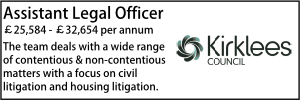










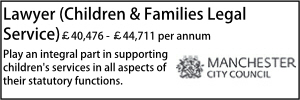



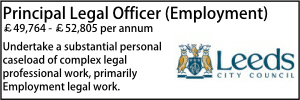











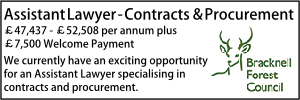
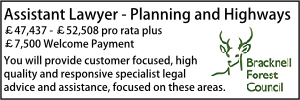





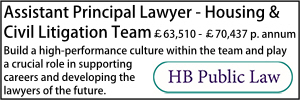

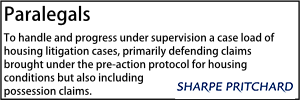
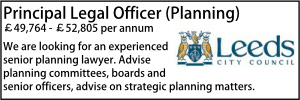
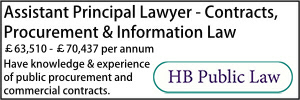


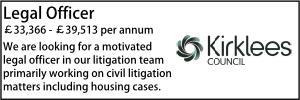




 A-Z Family Law: Take Two! - 42 Bedford Row
A-Z Family Law: Take Two! - 42 Bedford Row  Executive Programme in Public Procurement Law and Policy - University of Nottingham
Executive Programme in Public Procurement Law and Policy - University of Nottingham  Property Law Roadshow 2025 - Bristol - St John's Chambers
Property Law Roadshow 2025 - Bristol - St John's Chambers  CUBAS Comprehensive Training & Licencing (Manchester), September 2025
CUBAS Comprehensive Training & Licencing (Manchester), September 2025  AI in the Public Sector Conference - Westminster Insight
AI in the Public Sector Conference - Westminster Insight  Activism in the Workplace - 42BR Barristers Employment Law Annual Lecture
Activism in the Workplace - 42BR Barristers Employment Law Annual Lecture  DoLS Authoriser Training - LPS Law
DoLS Authoriser Training - LPS Law  Property Law Roadshow 2025 - Cardiff - St John's Chambers
Property Law Roadshow 2025 - Cardiff - St John's Chambers  Annual Fraud Conference 2025 - Oxford Investigation Service
Annual Fraud Conference 2025 - Oxford Investigation Service